As colleges around the country grapple with how to reopen in the fall, Cornell University's president on Tuesday announced that it will welcome students back to campus — an option she said is best not only for their education, but also public health.
The Ivy League university decided that compared with holding classes only online, residential learning would be safer for students and the wider community because it can ask students to participate in a screening program to detect and contain any spread of the coronavirus, President Martha Pollack said.
"The key consideration in our decision to reopen is public health," Pollack said in a statement.
Modeling by a Cornell research team determined that two to 10 times more people could be infected with COVID-19 during an online-only semester, with significantly higher numbers becoming seriously ill. That's because many students planned to return to off-campus housing in Ithaca, New York, where the university is located, and it would have no authority to mandate testing or restrict student behavior if instruction was done remotely.
People are also reading…
As planned, students on and off campus will be subject to agreements to follow public health guidelines and comply with a testing program. Testing will start before or upon students' arrival in Ithaca, followed by frequent screening and a daily online health questionnaire. Masks and social distancing will be required in classrooms, large gatherings will be restricted and dining will be takeout or by online reservation at distanced tables.
Citing concerns for the health of students and faculty, some universities and colleges have abandoned hope of in-person instruction this fall or developed plans for bringing back smaller numbers of students to reduce the density of people on campus. Dozens of others have announced plans to reopen with modifications to campus life.
Fall classes start Sept. 2 as a blend of in-person and online instruction and most students will return home before Thanksgiving and finish the term with online instruction and exams in December. Remote learning options will be available for students unable to return to Ithaca.
Most of the 24,000 students at Cornell left Ithaca in March when the coronavirus pandemic struck, leaving the small college town's businesses reeling. Cornell students spend an estimated $225 million annually, fueling a thriving local economy.
Guidelines issued by the Centers for Disease Control and Prevention say colleges should work with state and local officials to decide how to reopen and should follow safety measures such as smaller classes in larger rooms.
The CDC is not recommending entry testing for all returning students, faculty, and staff, according to guidance issued Tuesday. Agency officials said that kind of testing has not been systematically studied, and it's not clear if it would reduce the spread of the coronavirus. CDC is recommending testing for anyone with coronavirus-like symptoms, and for anyone recently exposed to someone who tested positive.


















